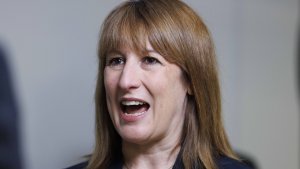UK Borrowing Figures Open Up Room For Tax Cuts In March Budget
The government's debt interest bill was the lowest for the month of December since 2020.

British finance minister Jeremy Hunt received a boost as he works on possible tax cuts before a national election expected later this year when data showed that he would have more wiggle room in his March budget plan than previously expected.
Britain posted a smaller-than-expected budget deficit of 7.77 billion pounds ($9.9 billion) in December, less than half the figure a year earlier, the Office for National Statistics said on Tuesday.
Economists had expected public sector net borrowing, excluding state-owned banks, of 14 billion pounds, the same as the estimate from the government's budget watchdog.
The government's debt interest bill was the lowest for the month of December since 2020, reflecting the fall in inflation.
Borrowing in the first nine months of the financial year totalled 119.1 billion pounds, 11.1 billion pounds higher than in the April-December period a year earlier but almost 5 billion pounds less than the budget watchdog's forecast for the period.
The year-to date figure was helped by a 5 billion-pound upwards revision of corporation tax receipts, the ONS said.
Hunt and Prime Minister Rishi Sunak have said they want to cut taxes further and many investors are expecting giveaways to voters in a March 6 government budget, ahead of an election expected later this year.
Britain is currently on course to have the highest tax burden - as measured by taxes as a share of gross domestic product - since the Second World War, angering many lawmakers in the ruling Conservative Party.
At the time of his budget update in November, Hunt was judged to have only a narrow margin of 13 billion pounds to make future tax cuts or spending increases and remain on course to meet his target for bringing down the public debt burden.
Since November, however, expectations in financial markets for future interest rates have fallen sharply, offering a bit more leeway in the budget for Hunt.
Ruth Gregory, an economist with Capital Economics, said Hunt might now have 20 billion pounds worth of so-called fiscal headroom in his March budget.
"That will probably allow him to unveil a freeze in fuel duty in April 2024 (costing about £6.0bn a year) but perhaps also to announce more crowd-pleasing measures, such as a 1p cut to income tax (costing £6.9bn a year), while still maintaining fiscally prudent appearances," Gregory said.
Samuel Tombs at Pantheon Macroeconomics said Hunt might tread more cautiously to avoid reducing the Bank of England's scope to cut interest rates "and the Conservatives cannot risk pushing up mortgage rates again."
British borrowing has surged in recent years, first as the government supported the economy during the COVID pandemic and then as it provided massive aid to households and businesses to offset the surge in energy prices in 2022.
Tuesday's data showed public sector net debt, excluding state owned banks, stood at 2.69 trillion pounds, equivalent to 97.7% of economic output.
Hunt has set himself a fiscal rule to keep debt on course to fall as a share of GDP in five years' time.
(Reporting by Sachin Ravikumar; Editing by William Schomberg and Andrew Heavens)
Thanks for signing up to Minutehack alerts.
Brilliant editorials heading your way soon.
Okay, Thanks!

